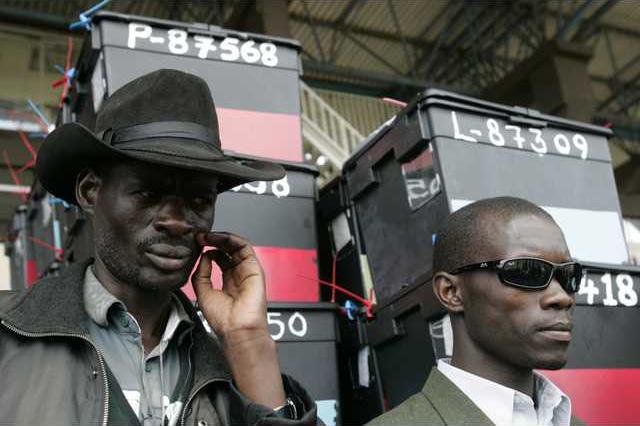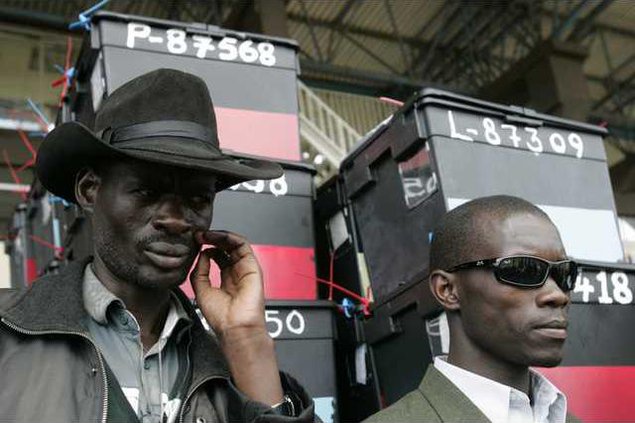NAIROBI, Kenya — The opposition leader who has cast himself as an agent of change and champion of the poor looked likely to unseat incumbent President Mwai Kibaki in Kenyan elections, according to unofficial media tallies of the vote on Friday.
The election Thursday was only the second truly democratic vote in Kenya’s history and the first time an incumbent president has faced a credible challenge. It was also shaping up to be the closest presidential race in four decades of independence from Britain. However, the slow pace of official returns raised fears of rigging.
Violence was a major concern in the run-up to the election, and several diplomats have expressed concern that a narrow victory on either side could lead to rioting by those who do not accept or trust the results. But the voting was generally orderly, and no major disruptions were reported.
Kibaki, 76, has been credited with helping boost this East African nation’s economy, with a growth rate that is among the highest in Africa and a booming tourism industry. But his anti-graft campaign has largely been seen as a failure, and the country still struggles with tribalism and poverty.
Opposition leader Raila Odinga, a flamboyant 62-year-old former political prisoner, promised change and help for the poor. His main constituency is Kibera, one of Africa’s largest slums, a maze of potholed tracks and ramshackle dwellings that is home to at least 700,000 people.
But he has been accused of failing to do enough to help his constituents during 15 years as a lawmaker.
Unofficial results reported by local media, taken from tallies at some polling centers, all put Odinga in the lead. But the groups cautioned that not all constituencies had been checked.
Nation media group, one of the media tallies, said Odinga had 56 percent and Kibaki 37 percent after 21 percent of votes were tallied. It said the numbers were based on actual vote counts from some polling stations, thought there was no official verification.
Kenyans clustered around radios and televisions as results trickled in from around the country. But by Friday evening, preliminary official results had been announced in only 29 of Kenya’s 210 constituencies. Those counts showed Kibaki leading by 642,674 to 552,282 but the counting could stretch into Saturday.
In Washington, State Department spokesman Tom Casey praised the high turnout, which electoral officials estimated to be some 70 percent of Kenya’s 14 million registered voters.
‘‘The basic mechanics of the election, so far, look to be fairly good,’’ he said.
Kibaki urged Kenyans to wait for the official results.
Police Commissioner Mohamed Hussein Ali on Friday tried to head off any potential violence after the results are announced, urging whoever wins ‘‘not to engage in unbridled celebrations that will cause resentment.’’
To the losers, he instructed, ‘‘take it with dignity.’’
In the weeks and months before the election, clashes in western Kenya killed hundreds. An outlawed gang called Mungiki that had circulated leaflets in July calling on Kenyan youth to rise up against the government was blamed in a string of beheadings.
On Wednesday, authorities said opposition supporters had stoned three police officers to death in western Kenya, accusing them of being part of a government conspiracy to rig the elections.
At Nyayo Stadium in Nairobi, electoral officials checked the seals on ballot boxes and observers dozed on the concrete bleachers after spending the night listening to results come in. Reuben Onsongo, a party agent for Odinga’s Orange Democratic Movement, said he had been there since 3 a.m. to ensure the process wasn’t rigged.
‘‘Democracy allows us to be free,’’ he said, smoothing the lines from his rumpled suit.
If Kibaki loses, he will be Kenya’s first sitting president ousted at the ballot box. Analysts say the chance of a second transfer of power in two elections shows how Kenya’s democracy is thriving. Others, however, say it heightens the potential for trouble.
Kibaki won by a landslide victory in 2002, ending 24 years in power by Daniel arap Moi, who was constitutionally barred from extending his term. Moi’s blanket use of patronage resulted in crippling mismanagement and a culture of corruption that plunged Kenya into an economic crisis.
Odinga was a political prisoner under Moi’s regime.
To win, a presidential candidate has to get the most votes as well as garner at least 25 percent of votes in five of Kenya’s eight provinces. Different provinces tend to be dominated by different tribes, so the rule adopted with the advent of multiparty politics in 1992 was aimed at ensuring a president has some support in most of the country.
Kenya’s voters were also electing 210 members of parliament and more than 2,000 local councilors.
———
Associated Press writers Katharine Houreld, Tom Maliti and Malkhadir M. Muhumed contributed to this report from Nairobi.
The election Thursday was only the second truly democratic vote in Kenya’s history and the first time an incumbent president has faced a credible challenge. It was also shaping up to be the closest presidential race in four decades of independence from Britain. However, the slow pace of official returns raised fears of rigging.
Violence was a major concern in the run-up to the election, and several diplomats have expressed concern that a narrow victory on either side could lead to rioting by those who do not accept or trust the results. But the voting was generally orderly, and no major disruptions were reported.
Kibaki, 76, has been credited with helping boost this East African nation’s economy, with a growth rate that is among the highest in Africa and a booming tourism industry. But his anti-graft campaign has largely been seen as a failure, and the country still struggles with tribalism and poverty.
Opposition leader Raila Odinga, a flamboyant 62-year-old former political prisoner, promised change and help for the poor. His main constituency is Kibera, one of Africa’s largest slums, a maze of potholed tracks and ramshackle dwellings that is home to at least 700,000 people.
But he has been accused of failing to do enough to help his constituents during 15 years as a lawmaker.
Unofficial results reported by local media, taken from tallies at some polling centers, all put Odinga in the lead. But the groups cautioned that not all constituencies had been checked.
Nation media group, one of the media tallies, said Odinga had 56 percent and Kibaki 37 percent after 21 percent of votes were tallied. It said the numbers were based on actual vote counts from some polling stations, thought there was no official verification.
Kenyans clustered around radios and televisions as results trickled in from around the country. But by Friday evening, preliminary official results had been announced in only 29 of Kenya’s 210 constituencies. Those counts showed Kibaki leading by 642,674 to 552,282 but the counting could stretch into Saturday.
In Washington, State Department spokesman Tom Casey praised the high turnout, which electoral officials estimated to be some 70 percent of Kenya’s 14 million registered voters.
‘‘The basic mechanics of the election, so far, look to be fairly good,’’ he said.
Kibaki urged Kenyans to wait for the official results.
Police Commissioner Mohamed Hussein Ali on Friday tried to head off any potential violence after the results are announced, urging whoever wins ‘‘not to engage in unbridled celebrations that will cause resentment.’’
To the losers, he instructed, ‘‘take it with dignity.’’
In the weeks and months before the election, clashes in western Kenya killed hundreds. An outlawed gang called Mungiki that had circulated leaflets in July calling on Kenyan youth to rise up against the government was blamed in a string of beheadings.
On Wednesday, authorities said opposition supporters had stoned three police officers to death in western Kenya, accusing them of being part of a government conspiracy to rig the elections.
At Nyayo Stadium in Nairobi, electoral officials checked the seals on ballot boxes and observers dozed on the concrete bleachers after spending the night listening to results come in. Reuben Onsongo, a party agent for Odinga’s Orange Democratic Movement, said he had been there since 3 a.m. to ensure the process wasn’t rigged.
‘‘Democracy allows us to be free,’’ he said, smoothing the lines from his rumpled suit.
If Kibaki loses, he will be Kenya’s first sitting president ousted at the ballot box. Analysts say the chance of a second transfer of power in two elections shows how Kenya’s democracy is thriving. Others, however, say it heightens the potential for trouble.
Kibaki won by a landslide victory in 2002, ending 24 years in power by Daniel arap Moi, who was constitutionally barred from extending his term. Moi’s blanket use of patronage resulted in crippling mismanagement and a culture of corruption that plunged Kenya into an economic crisis.
Odinga was a political prisoner under Moi’s regime.
To win, a presidential candidate has to get the most votes as well as garner at least 25 percent of votes in five of Kenya’s eight provinces. Different provinces tend to be dominated by different tribes, so the rule adopted with the advent of multiparty politics in 1992 was aimed at ensuring a president has some support in most of the country.
Kenya’s voters were also electing 210 members of parliament and more than 2,000 local councilors.
———
Associated Press writers Katharine Houreld, Tom Maliti and Malkhadir M. Muhumed contributed to this report from Nairobi.

